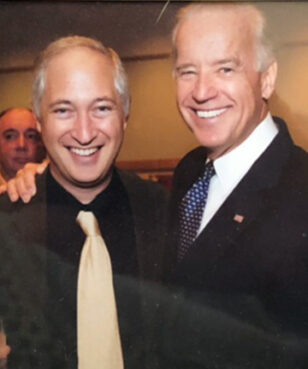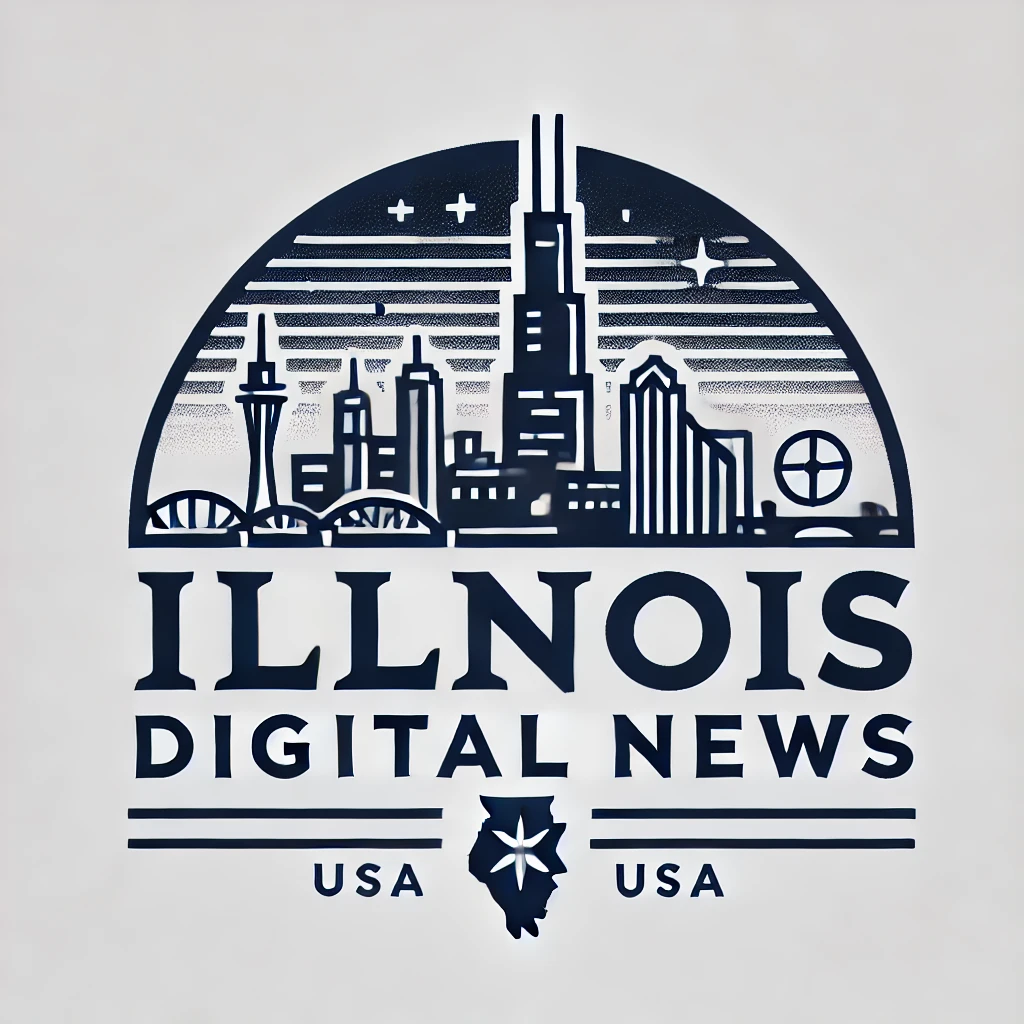(RNS) — When President Joe Biden finished his speech before the Democratic National Convention on Monday night (Aug. 19), most major television news networks quickly cut to pundit analysis of the man who unexpectedly bowed out of the race for the White House less than a month before.
But back in the convention hall in Chicago, thousands of Democratic delegates paused to listen to one more bit of business to close out the night: a pair of benediction prayers.
One of those prayers was offered by Rabbi Michael Beals of Temple Beth El in Newark, Delaware, a Conservative rabbi by training whom Biden refers to as “my rabbi.” Speaking in English and Hebrew, Beals blessed all three of the major Democratic figures at the heart of this year’s presidential contest: Biden, Democratic vice presidential nominee and Minnesota Gov. Tim Walz and Democratic presidential nominee Kamala Harris.
Prayers at party conventions have been common throughout U.S. history, but the experience is typically an unusual one for the religious leaders who offer them. Speaking to RNS on Tuesday via phone as he rode with a group packed into an Uber headed to the convention hall for the second night of the DNC, Beals reflected on the challenge presented by a convention prayer, his thoughts on the state of American politics and his relationship with the president.
This interview has been edited for clarity and length.
So, how did you end up delivering a benediction Monday night?
I got all weepy when they called me. They said it was the Harris-Walz committee and they were asking me to do this. I said, “Are you sure?”
Three parties — the governor’s group, the vice president’s group and our president’s group — each got to put names forward. They thought, for whatever reason, that I would be a good fit for the entire party. They felt that particularly last night, when Joe Biden was giving this beautiful kind of George Washington’s Farewell Address, was the appropriate time for me to pray.
Your prayer used a threefold structure, referencing Gov. Walz, Vice President Harris and President Biden. Did you write it ahead of time, or come up with it on the spot?
It was the hand of God.
I really love the threefold benediction, and I use it a lot in interfaith settings, because it’s a good unifying blessing — it’s good for Jews, Christians and Muslims. It’s in my spirit to be that way anyway, to be interfaith and inclusive, and I think the party wants to be that way too. The bigger the tent, the better it is for everybody. It’s very unlike the Republican Party, which tends to be very particularistic and kind of like, “They’re all Protestant Christians, and if you’re not, well, get with the program.”
I thought, “Oh my goodness, this works out really, really well for these three people we should be honoring.” Then I thought, “Well, what are three blessings?”
The first one was joy, which came to me because Gov. Walz has been speaking about the need to put joy into our entire public discourse. My favorite text of all is from Psalm 100, which is to serve God with joy — that’s actually on the collar of my prayer shawl, my tallit, when I pray. So that was easy.
For President Biden, he is all about gratitude. We’re so grateful for not only his 50 years of public service, but also his willingness to step away, which I know was difficult for him, but for the good of the country and the party.
For Vice President Harris, freedom is something she’s really been speaking about. I was thinking about laGōyyīm — being a light unto the nations — and also the fact that she’s putting light in dark places. After some really, really difficult public conversations, she’s really positive. It all came together so nicely — and then the trick was to keep the whole thing under two minutes.
As a rabbi, I feel like my No. 1 job is to teach. Had the RNC asked me to come and bless them, I would have done that too, because it’s not about being partisan. For me, it’s about going in and finding opportunities to teach — not to proselytize.
What was challenging about crafting a benediction for a party convention?
I wanted to be as inclusive as I could, so I tried to imagine a Republican or Christian or someone who’s not me, because I am registered as a Democrat. I want to make sure people other than me could hear the blessing and feel they were included, so I tried to maximize my empathy. That which you find hateful, don’t do to others.
I have co-presidents at my synagogue: One is a Trumper, and one is actually a Robert F. Kennedy Jr. supporter. I made a point of not sharing that I had this great honor, but members of the board, including the two presidents, went ahead and communicated it to the congregation — but we didn’t do it on the Sabbath, and we didn’t do it on the pulpit. I reiterated to them that I really want to respect the Sabbath as being kind of an oasis from the rest of the world.
I’ll speak values from the pulpit, to be sure, like if the former president refers to Mexican immigrants as illegal aliens, as rapists. I’ll speak to that because the Bible clearly says we have to show love to the stranger in our midst. And I will certainly tell people they ought to vote because it’s a religious responsibility — but not for whom they should vote, because I need to be the rabbi for everybody.
Can you share a bit about your relationship with President Biden?
He’s a deeply religious fellow, and you know, he’s not Jewish, but I’m his rabbi — because he told me.

Rabbi Michael Beals, left, and Vice President Joe Biden in 2012. (Courtesy photo)
I met him 18 years ago when I was a new rabbi in Wilmington. It was during a shiva service for a rather poor woman, a humble woman, named Sylvia Greenhouse. Shiva is so specifically, uniquely Jewish, and it was in a common room in Section 8 housing for the poor, because her apartment was too small. (Biden) came in late, and I asked, “What brings you here?” He said, “This woman gave $18 to my campaign every six years. I just wanted to show my gratitude by showing up.” And I thought, wow.
When I saw him at my congregants’ weddings, bar mitzvahs, whatever, he would say to me, “Such and such was my rabbi and such and such has been passed away for several years.” So I said to him, “You know, (that rabbi) has been dead these two decades. You need a new rabbi,” — but I wasn’t suggesting me. One day he’s holding a High Holiday party in the vice president’s mansion up on the top of Massachusetts Avenue. I was with my beautiful wife and a lot of Jewish people far more important than me, and he said, “Where’s my rabbi? Where’s my rabbi?” He turned around and said, “There’s my rabbi.” That’s kind of where it all started.
I saw him at the Christmas party last year at the White House, and I was standing with my wife getting a photo taken (with Biden). I asked the president, “Would you like a benediction and a blessing?” “Oh, would I ever,” he said. I put my hands on his forehead, and I gave him that same threefold benediction (from the DNC). He bowed his head in such humility, in such respect and such awe. He’s such a deeply religious person, so spiritual and so respectful, and I could feel I was literally putting water in his well, which was such an amazing responsibility and honor.
Has that relationship offered you insight into his political career, or recent aspects of his presidency?
Biden has seen a heck of a lot over 50 years of American history. When he started (in the U.S. Senate in 1973), he was put on the Foreign Relations Committee. He met (then-Israeli Prime Minister) Golda Meir right away — right before the Yom Kippur War in ’73. Israel’s been so blessed to have such an advocate all those years, and he was raised as a Zionist in his home: He tells a story about how his dad heard how America didn’t bomb the railroad tracks to Auschwitz. So when Israel became a country in 1948, he said to Joe Jr., “Joey, we’ve got to stand behind that country.” Joe Biden has been a Zionist since he was a boy.
And I don’t mean mistreatment of Palestinians — that’s not what it means to be a Zionist. On the contrary, to be a good Zionist is to make sure that Palestinians are treated with dignity, honor and love, and I think they should have a state of their own, with a secure state of Israel.
Do you have any additional thoughts about politics in general?
I think values and character are so important. There’s such a proclivity for sharing bad news, and I wish people running for office would tell more positive stories and maybe not speak so badly about the opposing candidate.
At the convention last night, when Vice President Harris’ sister and best friend’s mom spoke, I felt that was much better. I kind of cringed when people chanted, “Lock him up!” when they started talking about former President Donald Trump. I just don’t think getting in the mud is good for us, our society or our culture. And I don’t think it’s good for God.
Do you have any recommendations for others who might be called on to offer a prayer at a party convention?
You have to consider people of different faiths, different political persuasions when you give a benediction. You’re representing the Holy One.
You aren’t the only rabbi to pray at this DNC: As you may know, Rabbi Sharon Brous, who leads the IKAR Jewish community, is also offering an invocation this week.
Can I tell you something interesting about her? Brous and I are both ordained from the Jewish Theological Seminary of America, so our ordaining institution must be over the moon that they got two back-to-back!
What has your community’s response to your benediction been like?
They were so proud. I was overwhelmed between Facebook, texting and the emails. I didn’t want anybody to feel I was too big for my britches, but if they had made the time to thank me and say how proud they were, I wanted them to know how grateful I was that they felt that way.
Nothing negative, not one peep.
Wow — that seems unusual.
For Jews? You better believe it: Three Jews, five opinions.
